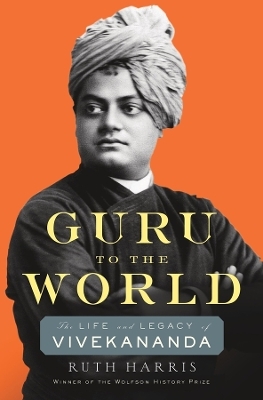
Guru to the World
The Life and Legacy of Vivekananda
Seiten
2022
Harvard University Press (Verlag)
978-0-674-24747-5 (ISBN)
Harvard University Press (Verlag)
978-0-674-24747-5 (ISBN)
Guru to the World tells the story of Swami Vivekananda, the nineteenth-century Hindu ascetic who introduced the West to yoga and to a tolerant, scientifically minded universalist conception of religion. Ruth Harris explores the many legacies of Vivekananda’s thought, including his impact on anticolonial movements and contemporary Hindu nationalism.
From the Wolfson History Prize–winning author of The Man on Devil’s Island, the definitive biography of Vivekananda, the Indian monk who shaped the intellectual and spiritual history of both East and West.
Few thinkers have had so enduring an impact on both Eastern and Western life as Swami Vivekananda, the Indian monk who inspired the likes of Freud, Gandhi, and Tagore. Blending science, religion, and politics, Vivekananda introduced Westerners to yoga and the universalist school of Hinduism called Vedanta. His teachings fostered a more tolerant form of mainstream spirituality in Europe and North America and forever changed the Western relationship to meditation and spirituality.
Guru to the World traces Vivekananda’s transformation from son of a Calcutta-based attorney into saffron-robed ascetic. At the 1893 World Parliament of Religions in Chicago, he fascinated audiences with teachings from Hinduism, Western esoteric spirituality, physics, and the sciences of the mind, in the process advocating a more inclusive conception of religion and expounding the evils of colonialism. Vivekananda won many disciples, most prominently the Irish activist Margaret Noble, who disseminated his ideas in the face of much disdain for the wisdom of a “subject race.” At home, he challenged the notion that religion was antithetical to nationalist goals, arguing that Hinduism was intimately connected with Indian identity.
Ruth Harris offers an arresting biography, showing how Vivekananda’s thought spawned a global anticolonial movement and became a touchstone of Hindu nationalist politics a century after his death. The iconic monk emerges as a counterargument to Orientalist critiques, which interpret East-West interactions as primarily instances of Western borrowing. As Vivekananda demonstrates, we must not underestimate Eastern agency in the global circulation of ideas.
From the Wolfson History Prize–winning author of The Man on Devil’s Island, the definitive biography of Vivekananda, the Indian monk who shaped the intellectual and spiritual history of both East and West.
Few thinkers have had so enduring an impact on both Eastern and Western life as Swami Vivekananda, the Indian monk who inspired the likes of Freud, Gandhi, and Tagore. Blending science, religion, and politics, Vivekananda introduced Westerners to yoga and the universalist school of Hinduism called Vedanta. His teachings fostered a more tolerant form of mainstream spirituality in Europe and North America and forever changed the Western relationship to meditation and spirituality.
Guru to the World traces Vivekananda’s transformation from son of a Calcutta-based attorney into saffron-robed ascetic. At the 1893 World Parliament of Religions in Chicago, he fascinated audiences with teachings from Hinduism, Western esoteric spirituality, physics, and the sciences of the mind, in the process advocating a more inclusive conception of religion and expounding the evils of colonialism. Vivekananda won many disciples, most prominently the Irish activist Margaret Noble, who disseminated his ideas in the face of much disdain for the wisdom of a “subject race.” At home, he challenged the notion that religion was antithetical to nationalist goals, arguing that Hinduism was intimately connected with Indian identity.
Ruth Harris offers an arresting biography, showing how Vivekananda’s thought spawned a global anticolonial movement and became a touchstone of Hindu nationalist politics a century after his death. The iconic monk emerges as a counterargument to Orientalist critiques, which interpret East-West interactions as primarily instances of Western borrowing. As Vivekananda demonstrates, we must not underestimate Eastern agency in the global circulation of ideas.
Ruth Harris is the author of Lourdes and The Man on Devil’s Island, which won the Wolfson Prize and the National Jewish Book Award. She is Senior Research Fellow at All Soul’s College, University of Oxford, Fellow of the British Academy, and Professor of European History at the University of Oxford.
| Erscheinungsdatum | 23.09.2022 |
|---|---|
| Zusatzinfo | 1 Maps |
| Verlagsort | Cambridge, Mass |
| Sprache | englisch |
| Maße | 156 x 235 mm |
| Gewicht | 1021 g |
| Themenwelt | Sachbuch/Ratgeber ► Gesundheit / Leben / Psychologie ► Entspannung / Meditation / Yoga |
| Geisteswissenschaften ► Geschichte ► Regional- / Ländergeschichte | |
| ISBN-10 | 0-674-24747-7 / 0674247477 |
| ISBN-13 | 978-0-674-24747-5 / 9780674247475 |
| Zustand | Neuware |
| Haben Sie eine Frage zum Produkt? |
Mehr entdecken
aus dem Bereich
aus dem Bereich
Mind-Body-Medizin, Achtsamkeit, Resilienz
Buch | Softcover (2024)
MWV Medizinisch Wissenschaftliche Verlagsgesellschaft
24,95 €
Eine magische Reise zu mehr Achtsamkeit, Selbstliebe und Glück
Buch | Hardcover (2022)
Gräfe und Unzer Verlag GmbH
19,99 €


